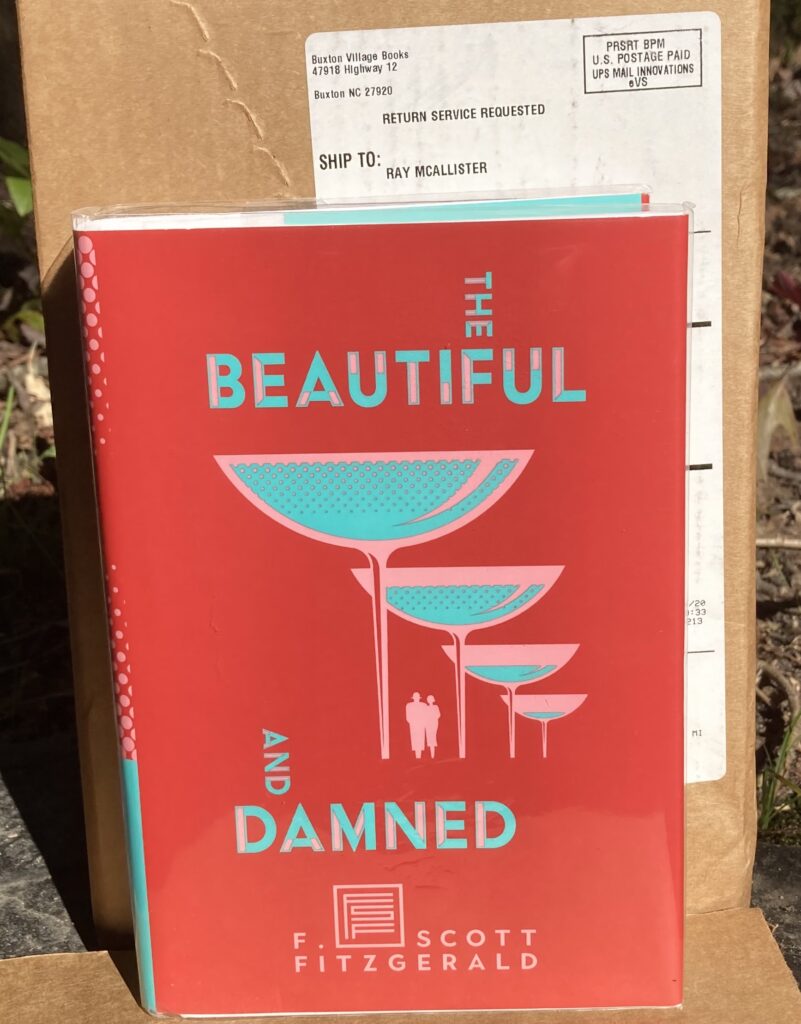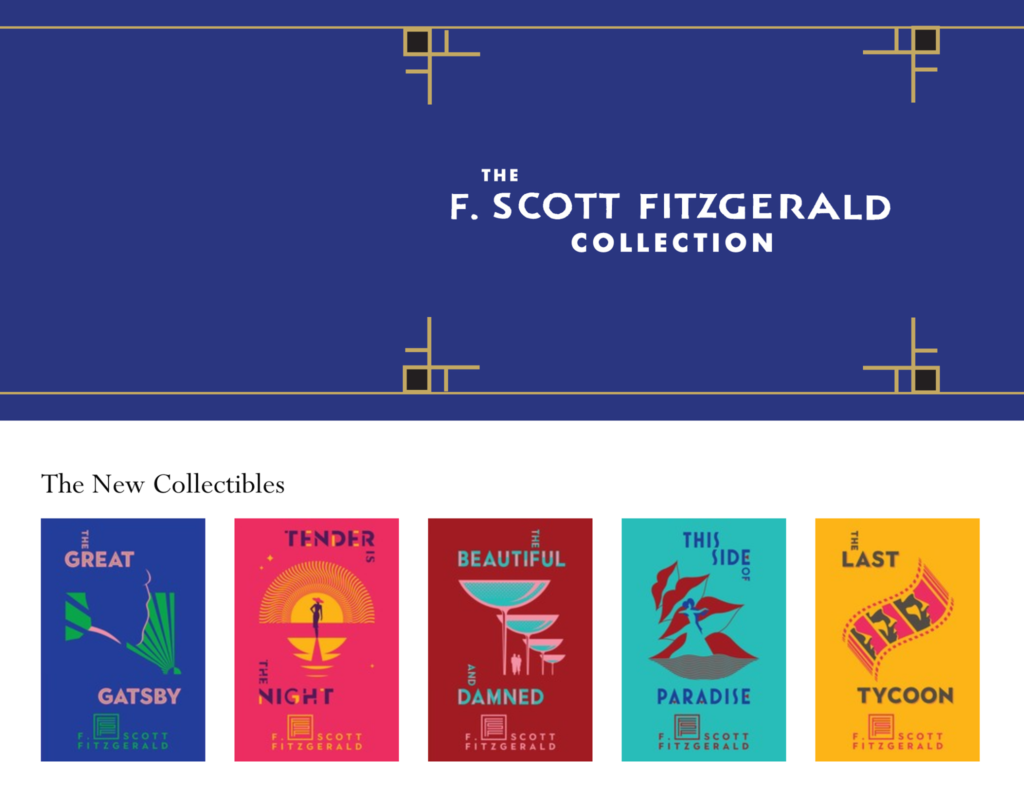7 Quick Thoughts on FSF’s Overlooked ‘Beautiful and Damned’
Fitzgerald’s second novel
slipped through the cracks—
but led to brilliance ahead
- 2nd month of F. Scott Fitzgerald reading challenge, 2nd novel, The Beautiful and Damned (1922)

Yes, F. Scott Fitzgerald wrote a novel with a soap opera title, The Beautiful and Damned. (It’s not a soap opera, though I suspect more than a few in 1922 were surprised to see “Damned” in a title.) Didn’t know of this book? I suspect most of us at least know OF the legendary writer’s startling debut (This Side of Paradise), obviously we know of his classic and near-classics (novels 3 and 4, The Great Gatsby and Tender Is the Night, respectively), and we’ve even heard of his fifth and final probably-would-have-been-a-classic-had-he-not-died-in-the-middle-of-writing-it novel, The Last Tycoon. But not this second book.
I have to admit, I only read B&D as part of a self-challenge. In fact, I had only ever read two of Fitzgerald’s novels. But Paradise turns 100 this year and, not surprisingly, new “Collector’s Editions” of his novels are out from his old publisher Scribner, now part of Simon & Schuster. (The more likely reason: the brilliant and lucrative The Great Gatsby, slips into the public domain January 1. Scribner may as well make whatever Gatsby money it can before everyone gets in on the action.)
These new editions, combined with Independent Bookstore Day on Aug. 29, gave me an excuse. I ordered one each from five of my favorite indies. (Shoutout here to Buxton Village Books, in Buxton, N.C., for The Beautiful and Damned.) You might consider doing the same.
There. My do-gooding is done.
So, seven quick thoughts after reading Fitzgerald’s second.
1. THIS KID, AND HE WAS JUST A KID, COULD WRITE . . .
Paradise had been written when Fitzgerald was only in his early 20s, published when he was just 23. Beautiful and Damned followed just two years later. Each was a financial success. More important, to us at least, they showed the makings of literary genius.
For starters, dude could write. Here’s an example, though I could show 50:
- “She was incomprehensible, for, in her, soul and spirit were one — the beauty of her body was the essence of her soul. She was that unity sought for by philosophers through many centuries. In this outdoor waiting room of winds and stars she had been sitting for a hundred years, at peace in the contemplation of herself.”
2. . . . BUT HE ALSO KNEW ABOUT LIFE.
Fitzgerald almost seemed to know too much about people for a young man only approaching his mid-20s.
Consider:

- “It is in the twenties that the actual momentum of life begins to slacken, and it is a simple soul indeed to whom as many things are as significant and meaningful at thirty as at ten years before. At thirty an organ-grinder is a more or less a moth eaten man who grinds an organ – and once he was an organ-grinder! The unmistakable stigma of humanity touches all those impersonal and beautiful things that only youth ever grasps in their impersonal glory.” … or …
- “The growth of intimacy is like that. First one gives off his best picture, the bight and finished product mended with bluff and falsehood and humor. Then more details are required and one paints a second portrait, and a third–before long the best lines cancel out–and the secret is exposed at last; the panes of the pictures have intermingled and given us away, and though we paint and paint we can no longer sell a picture. We must be satisfied with hoping that such famous accounts of ourselves as we make to our wives and children and business associates are accepted as true.”
3. HE HAD DEVELOPED PLOTTING.
Seems a necessity for a novel, but This Side of Paradise, while brilliantly written, seemed more observational than plot-driven. This time, for Beautiful, Fizgerald’s plot revolves around Anthony (sharing characteristics with Fitzgerald himself) and Gloria, the once-in-a-century beauty (sharing characteristics with his wife Zelda).
Anthony, born to the manor (a phrase NOT in this book), becomes a ne’er-do-well (another phrase not within) as he takes on a life of, almost literally, nothing. He’s bright beyond measure and cynical beyond measure. He finds life shallow and meaningless, while he, of course, is exalted, even if intended for nothing. Anthony is meant merely to wait on his grandfather’s inheritance, a significant plot point. Meanwhile, beyond making astute observations as easily as the rest of us butter toast, he drinks. Anthony is exceptionally good at drinking. (“Here’s to alcohol,” he intones, “the rose colored glasses of life.”) He’s also extraordinarily good at burning through mountains of cash, when he has them.
Now, Gloria. Gloria’s beauty gets the attention of any man, often more a burden than a blessing. A few men she plays with, before moving on. Anthony is overwhelmed by her, of course, and she, surprisingly, falls in love with him. Their relationship, and their relationships with others, drive the novel. So does his time in the army. So do their love, infatuation, loss of infatuation, differences, fights, jealousy, wealth, status, loss of money, loss of status, legal issues, drinking, drinking, and more drinking. And more drinking.
4. HE GIVES A SHOUTOUT TO THE ORIGINAL PANDEMIC.
In 2020, we’ve heard repeated references to the so-called “Spanish Flu” pandemic of 1918-19. In “Beautiful and Damned,” both Anthony and Gloria contract the flu, Anthony first, while in an Army training camp.
- … he reached his tent, only to fall into a heavy doze, from which he awoke before dawn, aching and unrefreshed. … At drill-call, he awoke with a heavy fever and fainted when he tried to leave his tent—at noon he was sent to the base hospital with influenza.
That pandemic was a major event—675,000 Americans died as did tens of millions worldwide—should make it into a novel of the moment is no surprise. But why did Anthony contract it so early? An editor’s note (from noted Fitzgerald expert James L.W. West III), explains: “The first cases of influenza in the deadly 1918 flu pandemic were recorded in Army training camps such as the one at which Anthony is stationed.” Gloria’s flu doesn’t come for another year.
- The next day she felt weak and ill. She tried to go out, and saved herself from collapse only by clinging to a mail box near the the front door. . . . For five days she was down with influenza, which, just as the month turned the corner into winter, ripened into double pneumonia.
5. FITZGERALD GAVE SHOUTOUTS TO . . . HIMSELF.
This is a book of its age, what would become known as the Jazz Age, and Fitzgerald was the foremost chronicler of it, and a famous writer, as well, so, yes, perhaps it made sense to include himself.
Let’s back up a bit. To some printings of This Side of Paradise Fitzgerald had added a single-page, signed “Author’s Apology,” claiming of the book, “to write it took three months; to conceive it—three minutes; to collect the data in it—all my life.” He went on: “My whole theory of writing I can sum up in one sentence: An author ought to write for the youth of his own generation, the critics of the next, and the schoolmasters of ever afterward.” He must have admired that advice, for in The Beautiful and the Damned, Anthony questions the thinking of a writer friend, Dick, who gave an interview. Dick responds:
- ” . . . Some of it was good, though, don’t you think?” . . . “Oh, yes; that part about the wise writer writing for the youth of his generation, the critic of the next, and the schoolmaster of ever afterwards.” . . . “Oh, I believe a lot of it,” admitted Richard Caramel with a faint beam. “It simply was a mistake to give it out.”
Later, the two are having a discussion on literature when …
- Dick interrupted him impatiently: “You know these new novels make me tired. My God! Everywhere I go some silly girl asks me if I’ve read ‘This Side of Paradise.’ Are our girls really like that? If it’s true to life, which I don’t believe, the next generation is going to the dogs. I’m sick of this shoddy realism. I think there’s a place for the romanticist in literature.”
6. THIS EDITION HAS EVERYTHING, INCLUDE ZELDA
These editions have lots of little extras, and Beautiful and Damned includes editor West’s very entertaining introduction and biography, plus his invaluable notes on the story. It also includes two alternate endings from Fitzgerald — and even a whimsical review of the book by his wife, Zelda, that appeared in the New York Tribune. Some excerpts:
- To begin with, everyone must buy this book for the following aesthetic reasons: first, because I know where there is the cutest cloth-of-gold dress for only three hundred dollars in a store on Forty-second Street, and also, if enough people buy it, where there is a platinum ring with a complete circlet, and also, if loads of people but it, my husband needs a new winter overcoat, although the one he has has done well enough for the last three years. . . .
- It seems to me on one page I recognized a portion of an old diary of mine which mysteriously disappeared shortly after my marriage, and also scraps of letters which, though considerably edited, sound to me vaguely familiar. In fact, Mr. Fitzgerald—I believe that is how he spells his name—seems to believe plagiarism begins at home.
7. FITZGERALD SEEMS A TAD CYNICAL
Fitzgerald is no happily-ever-after guy. His characters do not always fare well, though, to be fair, they can be dragged down by their own short-comings. His outlook, shall we say, skews toward the glass-half-empty perspective.
- “Life is so damned hard, so damned hard. . . . It just hurts people and hurts people, until finally it hurts them so that they can’t be hurt ever any more. That’s the last and worst thing it does.”
- “Things are sweeter when they’re lost. I know—because once I wanted something and got it. It was the only thing I ever wanted badly, Dot, and when I got it it turned to dust in my hand.”
- “And that taught me you can’t have anything, you can’t have anything at all. Because desire just cheats you. It’s like a sunbeam skipping here and there about a room. It stops and gilds some inconsequential object, and we poor fools try to grasp it – but when we do the sunbeam moves on to something else, and you’ve got the inconsequential part, but the glitter that made you want it is gone.”
- I shall go on shining as a brilliantly meaningless figure in a meaningless world.”
OK, but before you throw yourself a bridge, know that this book is entertaining, mesmerizingly written, and compels you to keep reading. It’s a powerful commentary on everything from classes to morality to decadence. It’s an experience every reader should have at least once.
That said, I can’t wait to reread his next one, Number 3, now that I have an idea where Fitzgerald has been and how he got there. This next one, as an aside, has been called the 2nd greatest English-language novel by Modern Library — and ranks 4th on the respected Greatest Books of All Time list.
A little thing called The Great Gatsby.
Perhaps you’ve heard of it.

This Side of Paradise (1920), from DOWNTOWN BOOKS, Manteo, N.C.
The Beautiful and The Damned (1922), from BUXTON VILLAGE BOOKS, Buxton, N.C.
The Great Gatsby (1925), from BOOKS TO BE RED, Ocracoke, N.C.
Tender Is the Night (1935), from QUARTER MOON BOOKS & GIFTS, Topsail Beach, N.C.
The Last Tycoon (1941). from FOUNTAIN BOOKSTORE, Richmond, Va.